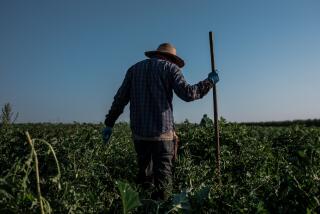Is there an economic case for ending all guest worker programs?
Employers and workers’ advocates alike are calling for reforms to the temporary guest worker programs that allow seasonal farmworkers and others to come work in the U.S. for parts of the year.
But some observers are proposing a different economic argument: abolishing guest worker programs altogether.
After all, these jobs, especially on farms, are so difficult that no Americans want to do them. Maybe if farmers weren’t given the opportunity to import cheap labor, they’d be able to create better jobs, argues Mark Krikorian, executive director of the Center for Immigration Studies, a Washington, D.C., think tank.
“Farmwork is lousy because farmers keep getting new ways of importing farmworkers,” he said. “So why would the industry have any incentive to change?”
Krikorian proposes giving farmers a transitional period, during which time they know they’ll have to stop bringing in labor from abroad. After that time, they’ll either have to pay workers more and recruit Americans, or find a way to mechanize crop planting so they don’t need workers at all.
The first option, raising wages and benefits, could also help solve the American unemployment problem. If farmers adjusted the crops they planted to be able to employ workers year-round, and not just on a seasonal basis, they might be able to pay a wage that families could live on for a year.
“There’s a lot of people who used to do farmwork, and don’t anymore, because it stinks,” Krikorian said.
The second option, mechanizing farmwork, is already happening to some extent in states such as California, where some farmers are switching to almonds because harvesting them is done mostly by machines. When the bracero program ended in 1964, cutting off a supply of cheap Mexican labor, many farmers automated more of their crops, Krikorian said. There’s no reason farmers can’t do that now. If certain crops can’t be harvested automatically, farmers should switch to crops that can.
“This argument that farmers have to have stoop labor -- it’s the same argument that Southern planters were making about slavery,” he said.
Of course, that means some crops might not be grown in the United States anymore. That’s fine, Krikorian says. Let China or Mexico harvest tomatoes or berries or cotton, and the U.S. can harvest what it can automate. Or, American consumers can pay more for products they know are harvested here, by well-paid employees who have full-time jobs with benefits.
Ending guest worker programs creates another problem, for the tens of thousands of workers from Mexico and other countries who depend on them for their livelihood. But they are not American citizens, and, put simply, they’re not our problem, Krikorian argues.
“It’s not the job of American immigration policy to alleviate global poverty,” he said.
ALSO:
Business owners emerge as vocal force in pro-immigration debate
Special licenses for immigrants draw protests in North Carolina
Florida farmer vilified after endorsing immigration reform
More to Read
Inside the business of entertainment
The Wide Shot brings you news, analysis and insights on everything from streaming wars to production — and what it all means for the future.
You may occasionally receive promotional content from the Los Angeles Times.











